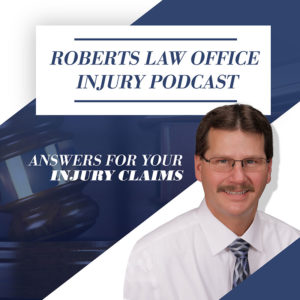Episode 76: Calloway County social security disability attorney Jeff Roberts reviews the various types of conditions you might have, which would qualify you for social security disability benefits. These conditions are found in the Listing of Impairments for social security claims.
Jeff has practiced law for 32 years. He focuses in personal injury, workers’ compensation and social security disability (both SSDI and SSI claims). At times, an injured individual may need to file 2 or more of these types of claims, all related to a single incident. The three types of cases overlap more than people might think. It can make it easier and more cost-effective if your attorney can handle each of these claims for you.
In Episode 56, Jeff explain what it means for the client when the attorney works on a contingency fee. Interestingly, personal injury claims, workers’ comp claims and social security disability claims are normally handled on a contingency fee basis. This means there are no upfront costs and the attorney’s fees are based on a percentage of what he/she recovers on your behalf. It’s a way to ensure everyone has access to the courts.
How to Qualify for Disability Benefits
Generally, there are 2 ways to be successful in your social security disability claim. The first is to meet criteria in the Listing for Impairments for social security claims. Jeff explains these scenario to both SSDI and SSI clients.
The Social Security Administration evaluates claims based on certain conditions combined with specific complications. If you do, normally, you’re automatically approved and considered disabled.
The second way you qualify for benefits is by having certain limits to your ability to perform your job, or a job. Your age and level of education are also factors that will be considered with your disability claim.
Jeff points out that if you don’t quite meet the Listing of Impairments, the law states that you have to meet “or equals” the criteria, so you may still have a chance to get approved. The judge can make the decision to deem you disabled. It’s a good idea to have an experienced social security disability attorney on your side. He/she will understand the nuances of the law and know how to best present your claim to the judge.
Nonetheless, many people choose to apply on their own, initially. Jeff covered this option in his discussion of Social Security Administration Form 3369 (Episode 67)
Applying for social security disability benefits (including SSI) takes a long time. This involves federal programs. As such, Jeff is licensed to represent people who wish to apply for social security disability benefits in all 50 states. He’s handled cases in Kentucky, Tennessee and several other states.
Breaking Down the Listing of Impairments for Social Security Claims
There are 14 categories the Social Security Administration uses to address different parts of the body, as it relates to impairments. Jeff will walk through each of them and provide some basic examples of what each criterion would include. Within the each of the categories, you also have to have the qualifying complications. This structure is supposed to make it easier for everyone to understand where they need to look and what might qualify for benefits.

Category 1: Musculoskeletal Disorders
This would involve spinal issues, such as someone who had low-back surgery and is experiencing complications. This category also includes injuries to weight-bearing joints such as your hips, knee and ankles. The category is related to the bone structure. Category 11 will focus on the neurological disorders. Some of the criteria are being changed, periodically. This is making it more difficult to qualify for benefits.
Category 2: Special Senses and Speech
This category mainly involves vision and hearing impairments. There are specific complications based on the specific condition.
Category 3: Respiratory Disorders
This includes lung issues, such as COPD, asthma, cystic fibrosis and other conditions. In Episode 44, Jeff discussed workers’ compensation for a chemical injury. As explained at the beginning of this episode, it’s not uncommon for one injury to qualify for several types of claims. Exposure to harmful chemicals can cause damage lung damage. If severe enough, that worker may also qualify for social security disability insurance benefits (SSDI).
Category 4: Cardiovascular System
Heart conditions and the problems with the vascular systems can qualify for social security benefits. Jeff comments that he’s represented several clients suffering from chronic heart failure. He’s also represented people who have experienced serious heart attacks, which can limit someone’s ability to work.
Category 5: Digestive Disorders
These can be extremely debilitating conditions. Jeff describes one such gastrointestinal condition in which a person can’t absorb enough nutrients through a normal diet. This can lead to rapid and unexpected weight loss. It can prevent them from working a normal range of hours. Jeff comments that this category also includes liver issues.
Category 6: Genitourinary Disorders
This are primarily chronic kidney diseases.
As a note to the conversation, the Listing of Impairments for Social Security Claims can help to accelerate the approval of an individual’s disability claim. However, as we discuss, Jeff doesn’t like telling a prospective client that he/she has a “great case.” In reality, if you automatically qualify based on these listing, you’re dealing with some very serious situations. Yes, the disability benefits help, but it still means the person is disabled.
Category 7: Hematological Disorders
This category is for various blood disorders. Anemia and other disorders would be included. As a child, Jeff suffered from anemia and needed to take iron supplements. It wasn’t severe enough to cause major problems. That is to say, qualifying bases on the Listing of Impairments for Social Security Claims means your condition is much more serious that what Jeff experienced.
Category 8: Skin Disorders
Jeff explains that this includes chronic psoriasis and photo-sensitivity issues. Typically, these are very severe disorders. In Jeff’s 32 years of practicing law, he’s never had a client qualify under this particular category. While they do exist, he’s simply never represented a case that severe.
Category 9: Endocrine Disorders
This includes issues related to the pancreas, such as diabetes. It also includes thyroid conditions and others. The category deals with various hormonal disorders, as well.
Category 10: Congenital Disorders that Affect Multiple Body Systems
Jeff comments that this category has changed over the years. Currently, it’s basically limited to include Down’s syndrome (also called Down syndrome).
Category 11: Neurological Disorders
This is a wide-ranging category. Spinal cord injuries can be included in the neurological disorders. The category focuses on the nerves, rather than the bones. This would include seizure disorders (e.g. epilepsy). Someone who experienced a serious stroke might have a chronic neurological disorder.
If someone was involved in a car wreck and loss the use of a limb, this is a neurological condition. Again, it’s also an example of one incident resulting in multiple types of claims.
This category also includes brain tumors and someone who has sustained a traumatic brain injury. Jeff discusses traumatic brain injuries in Episode 52. Some of these can occur from motor vehicle accidents or workplace injuries.
Cerebral palsy, ALS and muscular dystrophy are also part of the neurological disorders in Category 11.
In Jeff’s experience, musculoskeletal, cardiovascular, neurological and mental disorders are the types of conditions he sees, most frequently.
Category 12: Mental Disorders
Mental disorders could prevent someone from working a normal job. Significant depression, severe anxiety, bi-polar, PTSD and others make up the mental disorders that might qualify a person under Category 12.
These conditions might prevent you from doing daily activities. They could make it difficult for you to interact with other people. Jeff comments that the Social Security Administration had a greater understanding of the severity of mental health issues, long before other segments of our society.
Category 13: Cancer (Malignant Neoplastic Diseases)
Cancer is, unfortunately, extremely prevalent in today’s world. It can also impact other body parts in different categories in the Listing of Impairment for Social Security Claims. For instance, lung cancer might qualify under Category 13 and/or Category 3 (Respiratory Disorders).
Category 14: Immune System Disorders
These are often extremely serious disorders. The category includes autoimmune system disorders. AIDS and many other immune disorders are included. If your system is unable to fight off germs, you might not be able to be around groups of people. This might qualify you for social security disability benefits, based on your disability.
Jeff takes time to explain a key benefit in working with an experienced social security disability attorney. Because certain conditions might qualify under 2 or more categories, that attorney should understand how to evaluate how best to present your case, using all applicable categories. You shouldn’t assume you only qualify for one category, and if that’s rejected, then you’re out of options. That’s certainly not the case.
You can still pursue disability benefits via a formal hearing in front of a judge. Again, age, education, work-experience and limitations on your activities will all be important factors related to your claim.
What Do Other Clients Think About Jeff?
We always encourage listeners to read the Google Reviews Jeff Roberts has received from many of his clients. A 5-Star rating and the comments are earned recognition and demonstrate Jeff’s commitment to his clients. As a solo attorney, he has more Google Reviews than some firms with multiple attorneys. Jeff shares the credit with his staff at the Roberts Law Office. Successfully representing a victim of an automobile accident is a team effort. It’s why Jeff likes to say his firm offers small town service with big city results.
Jeff Roberts Represents Injured Clients Throughout Kentucky
With offices located in Calloway County and now Christian County, Jeff has a history of representing personal injury clients, workers’ compensation clients and social security disability clients across the state. He’s represented clients from Paducah, Bowling Green, Louisville, Covington, Whitesville and many other Kentucky locations. He’s not just a Western Kentucky injury attorney.
We hope you found this episode insightful and helpful. Thank you for listening!
Is It Time to Speak with an Attorney about Your Social Security Disability Claim?
The office phone number is (270) 753-0053 or toll free at 800-844-5108. For more information, visit www.JeffRobertsLaw.com. This podcast is meant to provide information and is not legal advice. Jeff’s principal office is located at 509 Main Street, Murray, Kentucky. Co-host Jim Ray is a non-attorney spokesperson. This is an advertisement.





